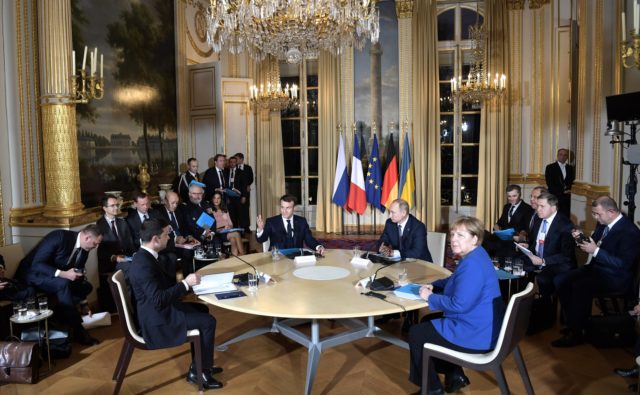
Lavrov’s Leaks: Moscow Embarrasses Berlin and Paris in Negotiations Over Ukraine (Part Two)
Publication: Eurasia Daily Monitor Volume: 18 Issue: 178
By:

*To read Part One, please click here.
While Kyiv, Berlin and Paris pursue (with varying degrees of intensity, frantically in Kyiv’s case) a high-level “Normandy” meeting as a goal for its own sake, without conditions or a clear agenda, Moscow is setting maximalist conditions for holding such a meeting, and pursues a predetermined agenda and outcome in equally maximalist terms (see Part One in EDM, November 29).
Russian Foreign Minister Sergei Lavrov, furthermore, invokes the United Nations Security Council’s (UNSC) resolution of February 17, 2015, to buttress Russia’s position within the Normandy format. In the second of his leaked messages to his German and French counterparts, Lavrov reminds them that the Minsk “agreement” of February 12, 2015, carries the UNSC’s unanimous approval, hence Ukraine cannot be allowed to revise that “agreement.” For any Normandy meeting to be held, therefore, “it is necessary to clearly reconfirm the letter of that document” (Mid.ru, November 17, 2021). Moscow has multiplied its references to that UNSC resolution in recent months, in the Normandy context and beyond it. Given the fact that the Barack Obama administration had helped rush that resolution through the UNSC and ensured its unanimous approval, Moscow seems to hint at an existing basis for discussions with the Joseph Biden administration about Ukraine.
Lavrov’s German and French counterparts, Heiko Maas and Jean-Yves Le Drian, tried to meet him half-way in their joint messages on November 4 and 5, next in the series of Lavrov’s leaks. The German and French ministers compromised their position from the outset with their sense of urgency in seeking a Normandy ministerial meeting, on November 11 if possible.
On one hand, they disagreed explicitly with Moscow’s proposal to stipulate in a joint concluding document that this conflict is internal to Ukraine and that Russia is a mediator in the Trilateral Contact Group. They also differed, though less firmly, with Moscow’s proposal to jointly endorse direct negotiations between Kyiv and Donetsk-Luhansk in the Contact Group. This idea “would undoubtedly not find support among Normandy countries,” Maas and Le Drian wrote, without specifying which countries would not support this idea. Paris is known to be more concession-prone than Berlin on this point.
Both ministers “remain convinced that the German-French draft of the ‘Key Clusters’ must form the basis for resolving differences” over the implementation of the Minsk documents and overcoming the deadlock in the Trilateral Contact Group. This is a strong defense of the German-French draft versus Russia’s version of the “Key Clusters” (authored by presidential aide Dmitry Kozak, not Lavrov). However, the German-French draft itself is a half-way compromise between the Russian and the Ukrainian positions, thereby playing for a draw, whereas Russia plays for winner-take-all. Kozak embarrassed his German and French counterparty by leaking the confidential Clusters documents to the press (see EDM, March 30, November 29), setting an example for Lavrov to follow with the same impunity.
Along with those differences, Maas and Le Drian reveal their points of agreement with Russia. “Our views coincide on the need for substantive advances in implementing the Minsk agreements in full […] the members of the Normandy format and Trilateral Contact Group being fully committed to those agreements’ implementation.” A Normandy ministerial meeting (if Russia deigns to allow it) should “make without delay decisions on further indispensable measures,” such as reconfirming the Trilateral Contact Group’s July 22, 2020, decisions on “additional measures to strengthen the ceasefire.” Those measures should be reinstated and go into effect again as early as December 1, 2021 (on the assumption that the wished-for Normandy meeting would have taken place before that date).
Those proposals are way out of line with Ukraine’s positions and national interests. Ukraine is fully committed to breaking out of the Minsk “agreements” by revising and reinterpreting them, instead of being rushed into their full implementation as Maas and Le Drian tell Lavrov. The Ukrainian government and military have, in the meantime, disavowed the July 22, 2020, agreement, which had equalized the Ukrainian forces with the Russia-led forces of Donetsk-Luhansk, legitimizing the latter (see EDM, August 6, 2020 and November 29, 2021).
The fact that Kyiv had in the first place made that agreement with Donetsk-Luhansk in the Trilateral Contact Group reveals the ambiguous, potentially misleading nature of the word Trilateral. The Group has indeed three “members,” but it does have a total of five participants, counting the Donetsk and Luhansk authorities. The Contact Group is supposed to host mediated negotiations between Kyiv and Donetsk-Luhansk, something that Kyiv has generally succeeded in avoiding, with rare lapses. The 2020 agreement with Donetsk-Luhansk on joint oversight of the ceasefire was the most serious lapse to date. Kyiv since then reversed it, but—as Maas and Le Drian suggest—pressing Kyiv to go back to that arrangement could become a part of the price for Russia’s consent to another Normandy meeting.
That price could rise higher if a Normandy ministerial meeting paves the way to a summit of the Normandy heads of state and government. According to Maas and Le Drian, a summit could discuss the political and security conditions (in that sequence) for holding local “elections” in the Russian-controlled territory, as well as changing Ukraine’s constitution and enacting a “special status” for that territory.
Lavrov does have a point when replying, in his November 16 message, that Berlin and Paris “continue to ignore Kyiv’s sabotage of the Minsk agreements.” This is Lavrov’s way of complaining that Kyiv wants to break out of that trap, even as Berlin and Paris suggest that Kyiv might stay in that trap. With this, Lavrov notified his German and French counterparts that he would make their secret correspondence public.



